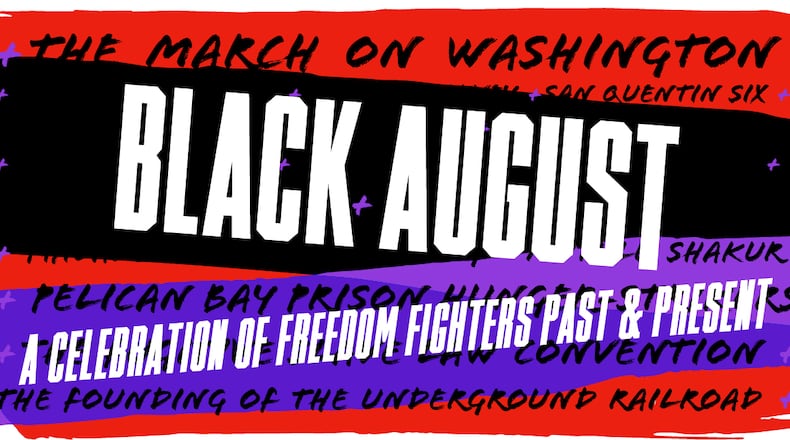Just days after freedom fighter Congressman John Lewis was laid to rest, people across the country are celebrating other courageous individuals who made sacrifices for the freedom of Black people.
Black August is a tradition that began in the 1970s after the assassination of George Jackson‚ a member of the Black Panthers and co-founder of a Black-organized crime group, the Black Guerrilla Family. The activist and author was gunned down on Aug. 21, 1971, while escaping prison as part of a prison rebellion in California.
The month that honors Black resistance comes on the heels of a summer marked by nationwide protests due to a number of killings linked to systemic racism or police brutality. George Floyd’s death in late May has led to a number of calls to defund police, eradicate police brutality and remove the barriers of race.
“Black August commemorates the rich history of Black resistance. Revolutionary moments such as the Watts Uprising, Haitian Revolution, Nat Turner Rebellion, Fugitive Slave Law Convention, and March on Washington all happened in August,” according to a statement on the Movement for Black Lives website. “Also, many of our revolutionaries, such as Marcus Garvey and Fred Hampton, were born in August. Black August was started in California prisons in the 1970s by Black freedom fighters who wanted to honor the lives and struggle of Black political prisoners killed by the state.”
Though the monthlong observance has been in place for decades, it has been generally unknown in the mainstream. Here are a few things to know about the legacy of Black August:
How did George Jackson inspire Black August?
Prior to his death, Jackson had spent more than a decade in prison on theft charges. While there, he studied the teachings of Karl Marx and Vladimir Lenin, Julius Lester wrote in a New York Times column. Lester described Jackson as someone who began conditioning himself to overcome the conditions of prison life, especially those experienced as a Black man.
“He began to discipline his mind and his body toward one end: revolution. His commitment could be seen in his face, in the way he walked, in the way he talked, and though he was never the instigator of trouble, he never failed to defend himself when trouble came. It did; it had to, for prisons do not rehabilitate. They destroy and call it rehabilitation. George Jackson refused to be destroyed,” Lester wrote.
On the day of his death, Jackson, who founded the prison gang the Black Guerrillas, met with his attorney Stephen Bingham about his upcoming trial for allegedly murdering a guard. At some point in the conversation, Bingham reportedly passed Jackson a gun, which he hid under a wig, according to a Los Angeles Times report. The activist and author then used the gun to force a prison guard to release him and more than two dozen other prisoners. The act resulted in a riot that lasted a little more than 30 minutes but ended in Jackson and five other inmates’ deaths. Many activists consider the trials that followed that riot as one of the formidable steps toward prison reform. The incident also shed light on some of the racism at California prisons.
Credit: VIa Wikipedia
Credit: VIa Wikipedia
Eric Cummins in “The Rise and Fall of California’s Radical Prison Movement” describes Jackson as one of the most outspoken voices on racism in the criminal justice system at the time, which allowed for others considered political prisoners to have the support of activists and scholars who began studying the criminal justice system.
Who does the month celebrate besides George Jackson?
The month honors political prisoners who have helped educate others on the ails of the prison system and spent time incarcerated while also highlighting the message that Black people’s “collective freedom depends on abolishing the state’s capacity, through incarceration, policing, and surveillance, to disrupt communities and diminish principled struggle against the unjust status quo,” according to the nonprofit Center for Constitutional Rights.
August seeks to provide some history on other Black resistance efforts as well, including the Haitian Revolution, Watts rebellion and the Ferguson uprising -- one of the most recent that could be compared with some of the demonstrations after Floyd’s death. All those movements were responses to injustices in and out of prison dealing with Black people. The Ferguson uprising, for instance, began after the fatal police shooting of 18-year-old Michael Brown. His death led to nationwide protests, some that resulted in looting and violence, and a look at how police use force.
Now, according to the CCR, the recognition of Black freedom fighters and political prisoners is an effort to decarcerate prisons, jails and detention centers, to end death-by-incarceration sentences and to push back against violence by police, referred to by some as “state-funded” violence. Because some of the issues of Jackson’s time continue, Black August is intended to push forward other “Black liberation” in this modern day, according to a statement by CCR.
“As the Black freedom struggle continues, so too does our commitment...Together, we will honor the faith that past resistance has taught us and lean into the hope that the present fight for liberation has brought us,” the statement reads.
About the Author
Keep Reading
The Latest
Featured




